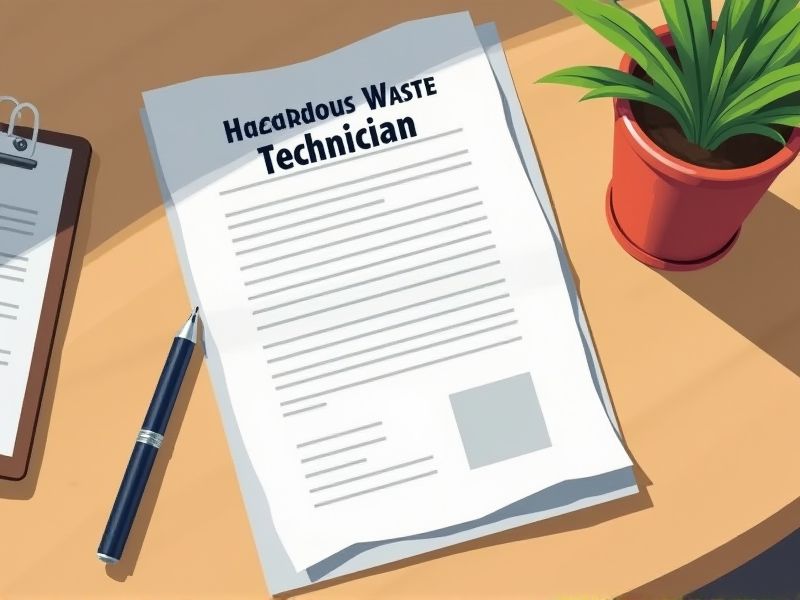
Hazardous Waste Technicians handle materials that can pose significant risks to health and the environment, which necessitates specialized knowledge and skills. Certifications ensure that technicians are equipped with the necessary expertise to manage these materials safely and comply with regulatory standards. A lack of appropriate certification can lead to safety violations and financial penalties for organizations handling hazardous waste. Here are essential certifications for those pursuing a career as a Hazardous Waste Technician.
OSHA HAZWOPER 40-Hour Certification
OSHA HAZWOPER 40-Hour Certification is required to ensure that Hazardous Waste Technicians understand how to safely handle and dispose of hazardous materials, minimizing risk to themselves and the environment. Exposure to toxic substances during cleanup activities can lead to significant health issues, which the certification aims to prevent through proper education and procedures. Compliance with OSHA standards is legally mandated for employers to protect their workers, reducing liability and enhancing workplace safety culture. Certified technicians carry enhanced credibility and skill, leading to higher job performance and decreased incident rates.
OSHA HAZWOPER 8-Hour Refresher Certification
Failing to maintain HAZWOPER 8-Hour Refresher Certification can lead to lapses in safety awareness among Hazardous Waste Technicians. Regular refresher courses help ensure compliance with OSHA regulations, reducing the likelihood of costly penalties or legal issues for employers. This certification aids in updating technicians on the latest safety protocols and hazard recognition strategies, contributing to a safer work environment. Routine training reinforces the techniques and procedures essential for effective emergency response and hazardous waste management.
EPA Hazardous Waste Operations Certification
Hazardous waste technicians handle dangerous materials that pose risks to human health and the environment. The EPA Hazardous Waste Operations Certification provides the necessary training to safely manage and dispose of these substances, minimizing potential harm. This certification ensures compliance with federal regulations, reducing legal liabilities for employers. Proper certification enhances a technician's skill set, increasing their job prospects and operational safety.
Resource Conservation and Recovery Act (RCRA) Training Certification
The Resource Conservation and Recovery Act (RCRA) Training Certification ensures hazardous waste technicians possess necessary knowledge to handle waste legally and safely. This certification helps prevent environmental contamination by educating technicians on proper waste management practices. Certified technicians are more equipped to minimize health risks associated with hazardous waste exposure. Companies benefit from reduced liability and compliance with federal regulations, decreasing potential fines and legal issues.
DOT Hazardous Materials Transportation Certification
The Department of Transportation (DOT) Hazardous Materials Transportation Certification ensures that hazardous waste technicians understand the regulations and safety protocols for transporting dangerous substances. Compliance with these regulations reduces the risk of accidents and spills during transit, safeguarding both public health and the environment. Proper certification enables technicians to identify and handle various hazardous materials, preventing potential contamination or exposure. Legal obligations require certification to avoid fines and ensure that all materials are transported lawfully and efficiently.
NFPA 472 Hazardous Materials Technician Certification
The NFPA 472 Hazardous Materials Technician Certification establishes a standard level of expertise required for safely managing hazardous materials incidents. This certification ensures technicians possess critical skills for identifying, assessing, and mitigating hazardous materials risks, thus reducing potential harm to both personnel and the environment. Employers gain confidence in the technician's ability to effectively contain and remediate hazardous situations. Regulatory compliance is maintained, aligning with industry standards and ensuring adherence to safety protocols and legal requirements.
Confined Space Entry Certification
Confined Space Entry Certification is necessary for Hazardous Waste Technicians as it ensures they possess the essential knowledge to safely enter and work in restricted spaces where hazardous materials may be present. The certification process educates technicians on potential risks, such as oxygen deficiency and toxic exposure, which are common dangers in confined spaces. Training reduces the likelihood of accidents and health risks, thereby aligning with occupational safety regulations. Employers can rely on certified technicians to effectively manage hazardous situations, maintaining workplace safety and compliance.
Bloodborne Pathogens Training Certification
Bloodborne Pathogens Training Certification is critical for Hazardous Waste Technicians because it equips them with knowledge to handle materials that may be contaminated with infectious agents. Exposure to bloodborne pathogens poses significant health risks, including diseases like hepatitis and HIV, which are prevalent in hazardous waste sites. Certification ensures that technicians understand proper safety protocols, minimizing the risk of accidental exposure and contamination. Compliance with OSHA standards requires such training, directly impacting workplace safety and legal accountability.
First Aid/CPR Certification
First Aid/CPR certification for a Hazardous Waste Technician enables prompt response to potential on-site injuries or health emergencies. Handling hazardous materials increases the risk of exposure to toxic substances, making it crucial for technicians to administer immediate care. Certified technicians can minimize the impact of an accident by stabilizing victims until professional medical help arrives. The certification reinforces safety protocols, reducing the likelihood of severe incidents and promoting a safer work environment.
Chemical Spill Response Certification
Chemical Spill Response Certification is necessary for a Hazardous Waste Technician to ensure proper handling and remediation of hazardous materials, reducing environmental and health risks. Certification trains technicians in recognizing spill hazards, equipping them with strategies and equipment to address spills safely and efficiently. Meeting regulatory compliance requirements necessitates certified technicians to minimize legal liabilities and avoid fines for improper handling. Certification bolsters the technician's skill set, enhancing their capability to prevent accidents and respond effectively to chemical emergencies.
Summary
When you obtain certifications as a Hazardous Waste Technician, your skills and expertise become more recognized, making you a more attractive candidate to employers. Certified technicians often experience increased job opportunities and potential for higher salaries. Your enhanced knowledge can lead to improved job performance and safer work environments. Employers might prioritize your applications for positions due to your demonstrated commitment to industry standards and excellence.
